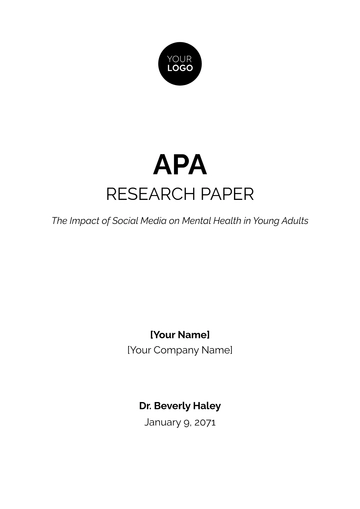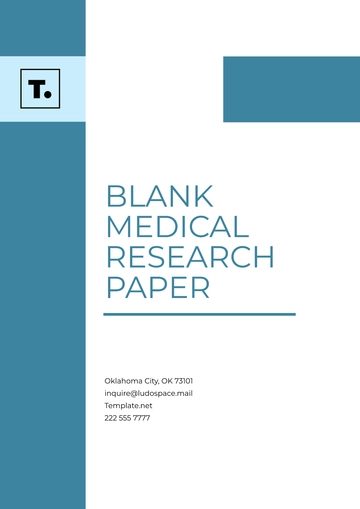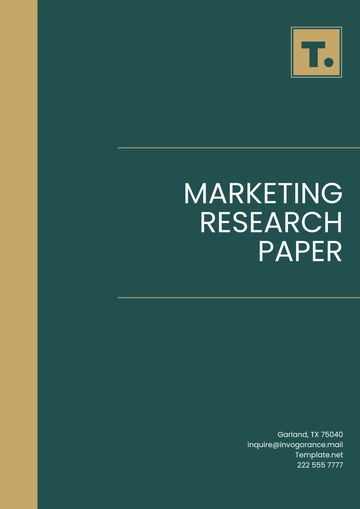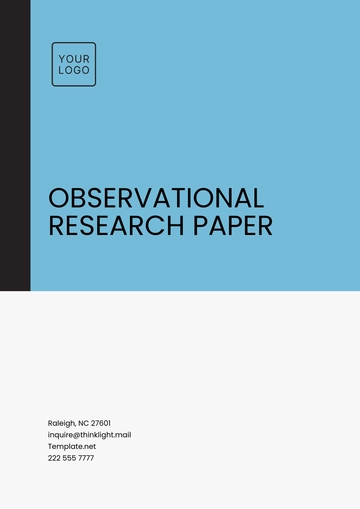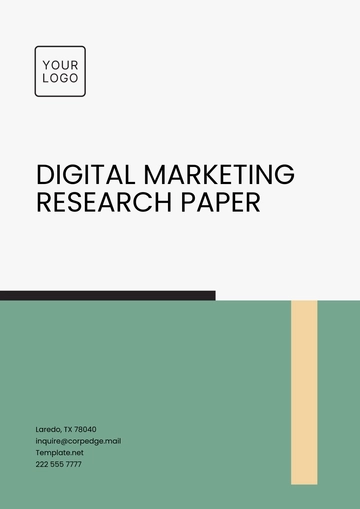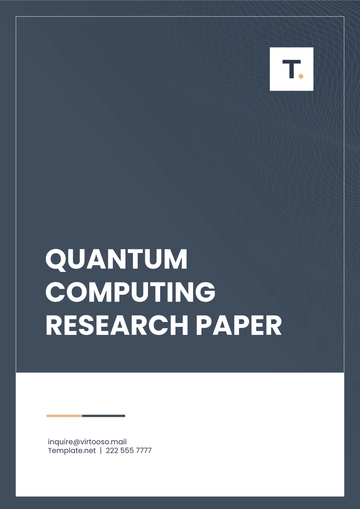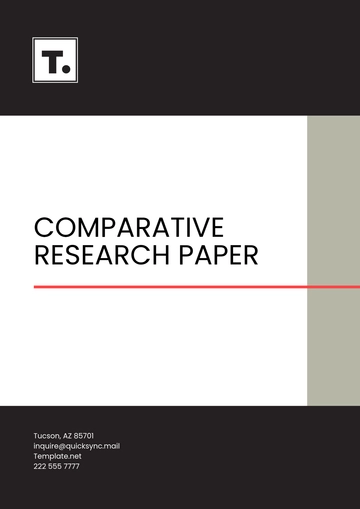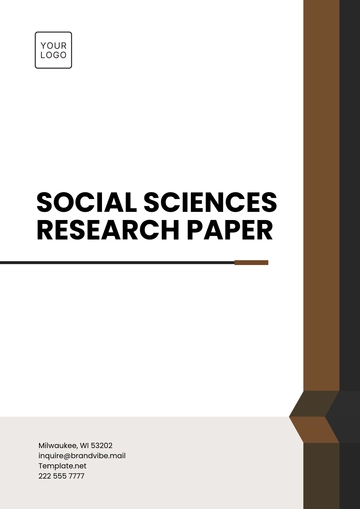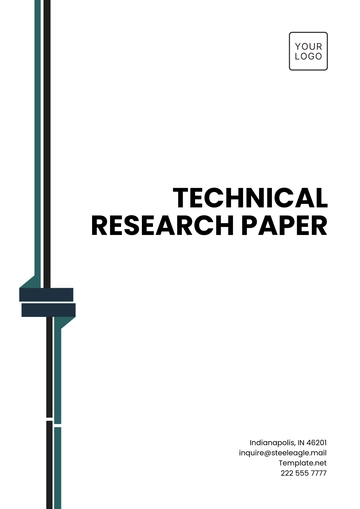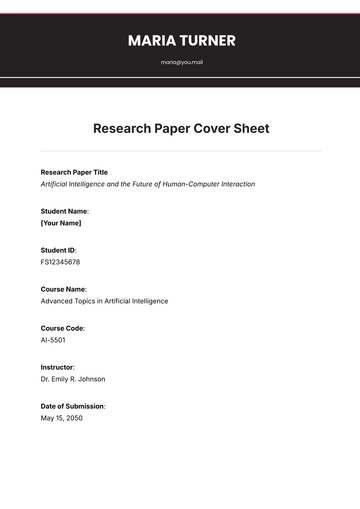Free Academic Paper

I. Introduction
Artificial Intelligence (AI) is poised to be a cornerstone of innovation in healthcare in the coming decades. Its rapid development in the fields of machine learning, data processing, and automation will drive the next era of medical advancements, offering new capabilities to diagnose, treat, and manage diseases. By 2070, AI technologies will not only enhance healthcare services but also revolutionize healthcare delivery, making it more efficient, personalized, and accessible.
This paper will explore the current trajectory of AI in healthcare, the technological advancements that will shape its future, the applications of AI, the ethical implications, and its projected economic impact by 2070. It aims to provide an in-depth understanding of the profound transformations in healthcare systems driven by AI technologies.
The structure of this paper includes:
Technological Advancements: An exploration of key technologies that will power AI's role in healthcare.
Applications of AI in Healthcare: A detailed look at how AI will be utilized across various domains in healthcare.
Ethical Implications: An analysis of the ethical challenges and concerns raised by the widespread use of AI.
Economic Impact: An assessment of AI’s role in reshaping the healthcare economy, from cost savings to job creation.
Conclusion and Future Prospects: A synthesis of the opportunities and challenges AI presents in the healthcare sector by 2070.
II. Technological Advancements in AI for Healthcare
AI’s integration into healthcare is underpinned by several key technologies, each contributing to more effective, accurate, and efficient healthcare practices. As these technologies evolve, their influence will extend far beyond current applications.
A. Machine Learning and Predictive Analytics
Machine Learning (ML) algorithms enable the extraction of patterns from vast datasets, a crucial element in predicting disease outbreaks, patient health trajectories, and treatment outcomes. By 2070, ML will be capable of analyzing not only patient data but also environmental and socioeconomic factors to predict disease outbreaks, epidemics, and pandemics with unprecedented accuracy. This ability will enable healthcare systems to act proactively, saving lives and reducing costs associated with late interventions.
Predictive analytics in healthcare will be particularly valuable in managing chronic diseases such as diabetes, hypertension, and heart disease. AI systems will continuously analyze real-time patient data, adjusting medication, recommending lifestyle changes, and predicting the onset of complications long before they become critical. Healthcare providers will be able to deliver more personalized care that improves patient outcomes.
B. Natural Language Processing (NLP)
Natural Language Processing (NLP) is another key area of advancement, helping to unlock insights from unstructured data such as doctor’s notes, medical records, and research papers. By [2070], NLP will enable real-time, advanced analysis of clinical texts, providing decision support for doctors. AI-driven systems will continuously learn from medical literature and patient records, making them more accurate and efficient as they process language and context to deliver relevant insights.
NLP will also improve patient interaction with AI systems, providing a more intuitive experience in areas such as virtual health assistants. These systems will enable patients to receive personalized advice, appointment scheduling, and even basic diagnostic support, all through natural language conversations.
C. Robotic Process Automation (RPA)
Robotic Process Automation (RPA) is already reducing administrative burdens in healthcare by automating routine tasks such as billing, scheduling, and claims processing. By [2070], RPA will have fully automated these and other administrative processes, reducing costs, improving efficiency, and freeing healthcare professionals to focus on patient care. Hospitals and clinics will rely on AI-driven systems to handle millions of administrative tasks with near-zero errors.
In addition to administrative tasks, RPA will support surgical teams by automating aspects of pre-operative and post-operative care, including patient record management and medication tracking. Such automation will be essential in improving the quality of care while reducing the workload on overburdened healthcare staff.
Table 1: AI Technologies and Projected Impacts in Healthcare (2050)
Technology | Application | Projected Impact by 2050 |
|---|---|---|
Machine Learning | Predictive analytics | Disease outbreak prediction (95%) |
Natural Language Processing | Clinical data analysis | Real-time decision support |
Robotic Process Automation | Administrative automation | Reduction of workloads (80%) |
III. Applications of AI in Healthcare
AI's applications in healthcare are vast and will continue to grow as the technology advances. Below are some key areas where AI will have a transformative impact by [2070].
A. Diagnostics
AI-driven diagnostic tools have already demonstrated their ability to match or exceed human performance in detecting certain conditions. For instance, AI systems are capable of analyzing medical imaging data—such as X-rays, MRIs, and CT scans—with far greater accuracy and speed than traditional methods. By [2070], AI algorithms will detect diseases like cancer, neurological disorders, and cardiovascular conditions with accuracy rates exceeding [98%]. These advancements will significantly reduce diagnostic errors and ensure timely treatment for patients.
Imaging and Radiology: Radiologists will increasingly rely on AI tools to analyze medical images, allowing them to detect tumors, fractures, and other abnormalities more quickly and accurately. For example, AI systems trained on vast datasets of medical images will be able to spot subtle patterns in imaging scans that the human eye might miss.
Pathology: AI tools will be used to analyze tissue samples and identify pathological changes at the cellular level. These systems will help pathologists detect early stages of diseases like cancer and assist in formulating personalized treatment plans for patients.
B. Personalized Medicine
AI is poised to revolutionize the field of personalized medicine, which tailors treatment to the individual based on genetic, environmental, and lifestyle data. In the coming decades, AI will be able to integrate data from various sources—including genomics, patient history, and real-time health data—to create highly individualized treatment plans. This will improve the efficacy of treatments, reduce side effects, and ensure more precise interventions for each patient.
For example, AI will enable genetic testing to determine the most effective drugs for treating cancers or rare genetic disorders. It will also optimize drug dosages and predict adverse reactions before they occur, making treatments safer and more effective. By [2070], personalized medicine will become the standard of care for many chronic and complex conditions, transforming patient outcomes.
Projected Diagnostic Accuracy of AI Tools
Year | Imaging Accuracy (%) | Pathology Accuracy (%) |
|---|---|---|
2050 | 75 | 70 |
2060 | 90 | 85 |
2070 | 98 | 95 |
C. Drug Discovery
AI has already demonstrated its potential to speed up the drug discovery process by analyzing complex biological data to identify potential drug candidates. In [2070], AI-powered tools will accelerate the discovery of new drugs and therapies, potentially cutting the average time to market from [10 years] to just [2 years]. This will significantly lower the costs of drug development, which currently runs into the billions of dollars for each new drug.
AI will also enable the discovery of treatments for previously untreatable conditions, including rare genetic diseases and complex neurological disorders. AI models will simulate molecular interactions and predict which drug compounds are most likely to be effective, reducing the need for costly and time-consuming clinical trials.
IV. Ethical Implications of AI in Healthcare
As AI technologies become more embedded in healthcare systems, several ethical concerns must be addressed to ensure equitable and responsible usage.
A. Bias and Fairness
AI systems are only as good as the data they are trained on. If the data is biased, AI systems can perpetuate and even exacerbate disparities in healthcare outcomes. For example, AI tools trained on data from predominantly white populations may be less effective at diagnosing conditions in minority populations. Ensuring that AI algorithms are trained on diverse, representative datasets will be a critical challenge moving forward. By [2070], AI systems must be regularly audited and adjusted to eliminate biases that could affect patient care.
B. Data Privacy and Security
As healthcare systems increasingly rely on AI-driven tools to process sensitive patient data, safeguarding privacy will be paramount. By [2070], it is expected that AI systems will be equipped with advanced encryption techniques and blockchain technology to ensure that patient data remains secure and tamper-proof. AI systems will also be required to comply with strict regulations, ensuring that data sharing between healthcare providers remains secure and that patients have control over their personal health information.
Data breaches in healthcare can be devastating, costing institutions millions of dollars and compromising patient trust. Preventing such breaches will require continuous innovation in cybersecurity measures.
C. Accountability and Decision-Making
With AI systems playing a central role in clinical decision-making, determining accountability for medical errors will be a significant ethical concern. If an AI system makes a wrong diagnosis or treatment recommendation, who is responsible? By [2070], the legal and regulatory framework will need to establish clear guidelines regarding accountability in AI-driven healthcare systems. This will ensure that patients have recourse in the event of harm and that healthcare providers are protected from unfair liability.
Table 2: Key Ethical Challenges and Proposed Solutions
Challenge | Description | Proposed Solution |
|---|---|---|
Bias and Fairness | Unequal healthcare outcomes | Diverse dataset training |
Data Privacy and Security | Vulnerability to breaches | Blockchain and encryption |
Accountability | Unclear decision-making responsibility | Regulatory frameworks for liability |
V. Economic Impact of AI in Healthcare
AI’s impact on the healthcare economy will extend beyond mere cost savings, with the potential to radically transform the economic landscape of healthcare systems worldwide. By 2070, AI is projected to generate substantial savings through increased operational efficiency, reduced errors, and improved patient outcomes. However, the economic impact will not be limited to cost reductions; the integration of AI will also create new opportunities for job growth, business innovation, and the development of entirely new market segments within healthcare.
A. Cost Savings
The adoption of AI in healthcare promises to significantly reduce operational costs across the industry, particularly in areas related to diagnostics, administrative tasks, and drug development. Healthcare systems worldwide are burdened with rising costs due to inefficiencies in patient care, manual processing of data, and lengthy drug development processes. AI tools, by automating and optimizing various functions, will reduce these costs and allow for more efficient allocation of healthcare resources.
AI in diagnostic accuracy and treatment optimization will yield savings through fewer diagnostic errors and reduced treatment failures. For instance, AI-driven imaging tools will detect diseases like cancer at an early stage, when they are most treatable, saving healthcare systems billions of dollars in later-stage treatment costs. A reduction in diagnostic errors will also cut down on unnecessary treatments and repeat visits to healthcare providers.
By [2070], it is estimated that AI will save the global healthcare industry approximately [$1 trillion] annually, primarily through:
Administrative Automation: AI will replace or significantly reduce the need for human intervention in administrative tasks such as scheduling, billing, and claims processing. These tasks currently consume a significant portion of healthcare resources. Automation of these processes can lead to annual savings of approximately [$300 billion].
AI in Diagnostics: AI’s ability to deliver faster and more accurate diagnoses will minimize unnecessary tests, hospital admissions, and surgeries. It is projected that AI-driven diagnostics could save healthcare systems around the world up to [$200 billion] annually.
Predictive Analytics: By leveraging data on patient health and historical trends, AI will help healthcare systems prevent the onset of chronic diseases, reducing the need for long-term, expensive treatments. Predictive analytics will help hospitals reduce readmission rates, saving an estimated [$150 billion] per year.
Moreover, AI will also streamline supply chain management in healthcare facilities, ensuring the optimal allocation of resources, minimizing waste, and reducing overstocking or stockouts. By automating inventory management and forecasting demand for drugs, equipment, and other essential supplies, AI will save healthcare organizations money while improving patient care.
B. Job Creation and Transformation
While AI will undoubtedly automate many existing tasks, it is also expected to create a large number of new jobs. According to a report by the World Economic Forum, AI is projected to create more than [58 million] new jobs globally by [2050]. The healthcare industry will be no exception to this trend, with job growth occurring in various AI-related fields, such as data science, machine learning engineering, and AI ethics and governance.
By [2070], it is projected that AI-related healthcare jobs will grow by [40%]. These positions will not only be focused on developing AI technologies but also in overseeing their deployment and ensuring that these technologies adhere to ethical standards and regulatory requirements. AI systems in healthcare will require continuous monitoring, updating, and maintenance, generating demand for skilled professionals in roles such as:
Data Scientists and AI Engineers: As healthcare facilities adopt more sophisticated AI systems, there will be a growing demand for data scientists who specialize in AI and machine learning. These professionals will develop and fine-tune algorithms used for diagnostics, patient monitoring, and treatment planning.
AI Ethics Specialists: With the increasing integration of AI into healthcare decision-making, healthcare institutions will require professionals focused on ensuring that AI systems are transparent, unbiased, and ethically sound. These specialists will focus on eliminating bias, ensuring fairness in AI algorithms, and promoting accountability in the use of AI for patient care.
AI Healthcare System Integrators: As healthcare organizations implement AI-driven solutions, there will be a need for integrators who can ensure seamless interaction between AI systems and existing infrastructure. These professionals will bridge the gap between healthcare providers and technology developers, ensuring that AI applications function effectively within the healthcare environment.
In addition to these technical roles, healthcare professionals such as doctors, nurses, and technicians will also experience job transformation. These professionals will no longer be bogged down by administrative work or manual data entry; instead, they will rely on AI tools to support their clinical decisions and improve the overall patient experience. As a result, healthcare jobs will shift to more complex and rewarding tasks, leading to greater job satisfaction.
Table 3: Economic Impact of AI on Healthcare
Economic Factor | Current (2050) | Projected (2070) |
|---|---|---|
Annual Cost Savings | $300 billion | $1 trillion |
AI-Related Job Growth | 10% | 40% |
VI. Challenges to AI Integration in Healthcare
Despite the clear benefits AI offers to healthcare systems, there are several challenges to its widespread adoption. These challenges range from technological and operational issues to ethical and legal concerns. Addressing these obstacles will be critical for healthcare organizations seeking to harness AI’s potential.
A. Interoperability of Systems
One of the most pressing challenges in the integration of AI into healthcare is ensuring that AI tools are interoperable with the wide variety of systems currently in use across the healthcare sector. Healthcare systems globally use a diverse range of electronic health record (EHR) platforms, clinical tools, and administrative software, many of which are not designed to communicate with one another. This lack of interoperability creates barriers to the effective use of AI systems, which rely on data from multiple sources to function optimally.
To overcome this challenge, healthcare providers and technology companies will need to work together to create common data standards and protocols that allow seamless data exchange across different platforms. By [2070], it is expected that global standards for data sharing will have been established, ensuring that AI tools can work across borders and different healthcare systems. This will allow AI-driven tools to have access to comprehensive datasets, improving their accuracy and effectiveness.
Interoperability will also enable better collaboration between healthcare providers, allowing them to share patient information and collaborate on treatment plans more efficiently. Furthermore, AI will be able to analyze large, interconnected datasets to generate insights that are more accurate and holistic, leading to better patient outcomes.
B. Training and Adoption
The successful integration of AI into healthcare will require significant investments in training healthcare professionals. While AI tools are designed to be user-friendly, healthcare providers must be educated on how to leverage these technologies effectively to enhance patient care. Without proper training, healthcare professionals may be hesitant to adopt AI tools, potentially delaying the transformation of healthcare delivery.
Training programs will need to be developed to equip healthcare professionals with the skills necessary to work with AI technologies. Medical schools and nursing programs will need to incorporate AI-focused curricula, ensuring that new generations of healthcare professionals are prepared for the AI-driven future of medicine. Additionally, hospitals and healthcare facilities will need to provide ongoing training to existing staff, allowing them to keep up with the latest AI innovations and remain confident in their use.
In addition to training, the healthcare workforce will also need to embrace a cultural shift in which AI is viewed as a tool for enhancing, not replacing, the role of human healthcare providers. AI will automate routine tasks, but it will also augment the decision-making process, allowing healthcare providers to make more informed, data-driven decisions.
VII. Conclusion and Future Prospects
The future of AI in healthcare looks incredibly promising, with the potential to revolutionize the industry by 2070. AI will transform how diseases are diagnosed, treated, and managed, leading to more personalized care, greater efficiency, and reduced costs. The economic impact will be profound, with AI driving major cost savings in healthcare operations and generating job growth in new fields such as AI development and ethics.
However, this transformation will not come without its challenges. Issues such as data interoperability, bias in AI algorithms, and the need for extensive professional training will need to be addressed for AI to reach its full potential in healthcare. Furthermore, the ethical implications of AI-driven decision-making and data privacy concerns must be carefully considered to ensure that healthcare remains equitable and patient-centered.
In the coming decades, healthcare organizations like [Your Company Name] will play a crucial role in shaping the AI-driven healthcare landscape. By working alongside regulators, researchers, and healthcare providers, companies can help guide the development of AI systems that are secure, ethical, and effective. If these challenges are addressed, AI will not only improve healthcare outcomes but also make healthcare more affordable and accessible for people around the world.
- 100% Customizable, free editor
- Access 1 Million+ Templates, photo’s & graphics
- Download or share as a template
- Click and replace photos, graphics, text, backgrounds
- Resize, crop, AI write & more
- Access advanced editor
Streamline your research and writing with the Academic Paper Template from Template.net. This editable and customizable format is perfect for creating scholarly papers with a professional layout. Personalize it quickly using the AI Editor Tool.



